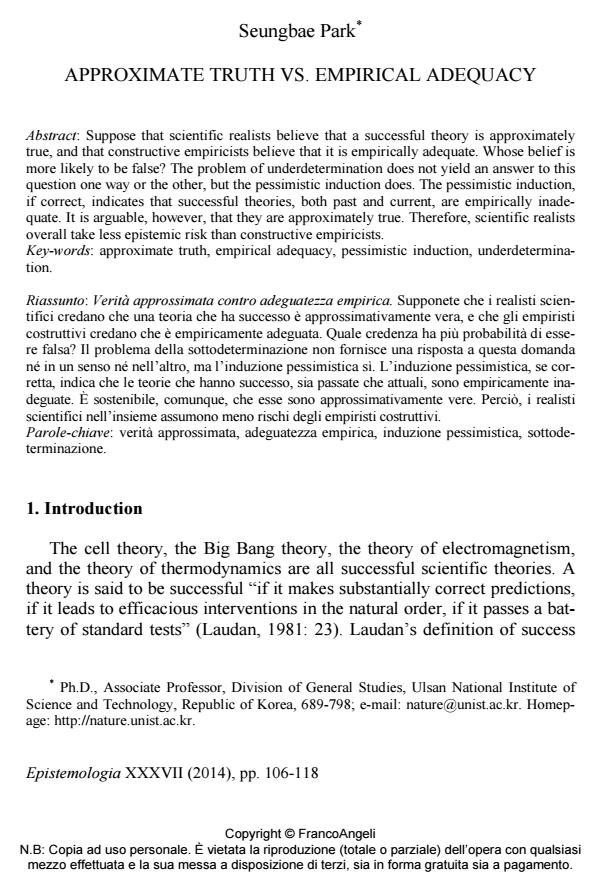Approximate truth vs. empirical adequacy
Journal title EPISTEMOLOGIA
Author/s Seungbae Park
Publishing Year 2014 Issue 2014/1
Language English Pages 13 P. 106-118 File size 589 KB
DOI 10.3280/EPIS2014-001007
DOI is like a bar code for intellectual property: to have more infomation
click here
Below, you can see the article first page
If you want to buy this article in PDF format, you can do it, following the instructions to buy download credits

FrancoAngeli is member of Publishers International Linking Association, Inc (PILA), a not-for-profit association which run the CrossRef service enabling links to and from online scholarly content.
Suppose that scientific realists believe that a successful theory is approximately true, and that constructive empiricists believe that it is empirically adequate. Whose belief is more likely to be false? The problem of underdetermination does not yield an answer to this question one way or the other, but the pessimistic induction does. The pessimistic induction, if correct, indicates that successful theories, both past and current, are empirically inadequate. It is arguable, however, that they are approximately true. Therefore, scientific realists overall take less epistemic risk than constructive empiricists.
Keywords: Approximate truth, empirical adequacy, pessimistic induction, underdetermination.
- Kitcher P. (1993). The advancement of science. New York, Oxford University Press.
- Ladyman J., Douven I., Horsten L., van Fraassen B. (1997). A defense of van Fraassen’s critique of abductive inference: Reply to Psillos. The Philosophical Quarterly, 47, pp. 305-321.
- Lange M. (2002). Baseball, pessimistic inductions and the turnover fallacy, Analysis, 62(4), pp. 2881-2885.
- Laudan L. (1981). A confutation of convergent realism, Philosophy of Science, 48(1), pp. 19-49.
- Leplin J. (1997). A novel defense of scientific realism, New York, Oxford University Press.
- Mizrahi M. (2012). Why the ultimate argument for scientific realism ultimately fails, Studies in History and Philosophy of Science Part A, 43(1), pp. 132-138.
- Park S. (2001). Scientific realism vs. scientific antirealism, Ph.D. Dissertation, Tucson, Arizona University Press.
- Park S. (2009). Philosophical responses to underdetermination in science, Journal for General Philosophy of Science, 40(1), pp. 115-124.
- Park S. (2011). Coherence of our best scientific theory, Foundations of Science, 16(1), pp. 21-30.
- Park S. (2014). Accepting our best scientific theories, Pensée, 76(3), pp. 131-139.
- Poincaré H. (1905/1952). Science and hypothesis. New York, Dover.
- Psillos S. (1997). How not to defend constructive empiricism: A rejoinder. The Philosophical Quarterly 47, pp. 369-372.
- Psillos S. (1999). Scientific realism: How science tracks truth. New York, Routledge.
- Putnam H. (1975). Realism in mathematics and elsewhere. In Philosophical Papers vol. 1., Cambridge University Press.
- Stanford K. (2000). An antirealist explanation of the success of science, Philosophy of Science 67, pp. 266-284.
- van Fraassen B. (1980). The scientific image. Oxford, Oxford University Press.
- Embracing Scientific Realism Seungbae Park, pp.201 (ISBN:978-3-030-87812-2)
- Explanatory failures of relative realism Seungbae Park, in EPISTEMOLOGIA 1/2015 pp.18
DOI: 10.3280/EPIS2015-001002 - Realism Versus Surrealism Seungbae Park, in Foundations of Science /2016 pp.603
DOI: 10.1007/s10699-015-9427-x - Scientific Realism versus Antirealism in Science Education Seungbae Park, in Coactivity: Philosophy, Communication /2016 pp.72
DOI: 10.3846/cpc.2016.241 - Embracing Scientific Realism Seungbae Park, pp.45 (ISBN:978-3-030-87812-2)
Seungbae Park, Approximate truth vs. empirical adequacy in "EPISTEMOLOGIA" 1/2014, pp 106-118, DOI: 10.3280/EPIS2014-001007